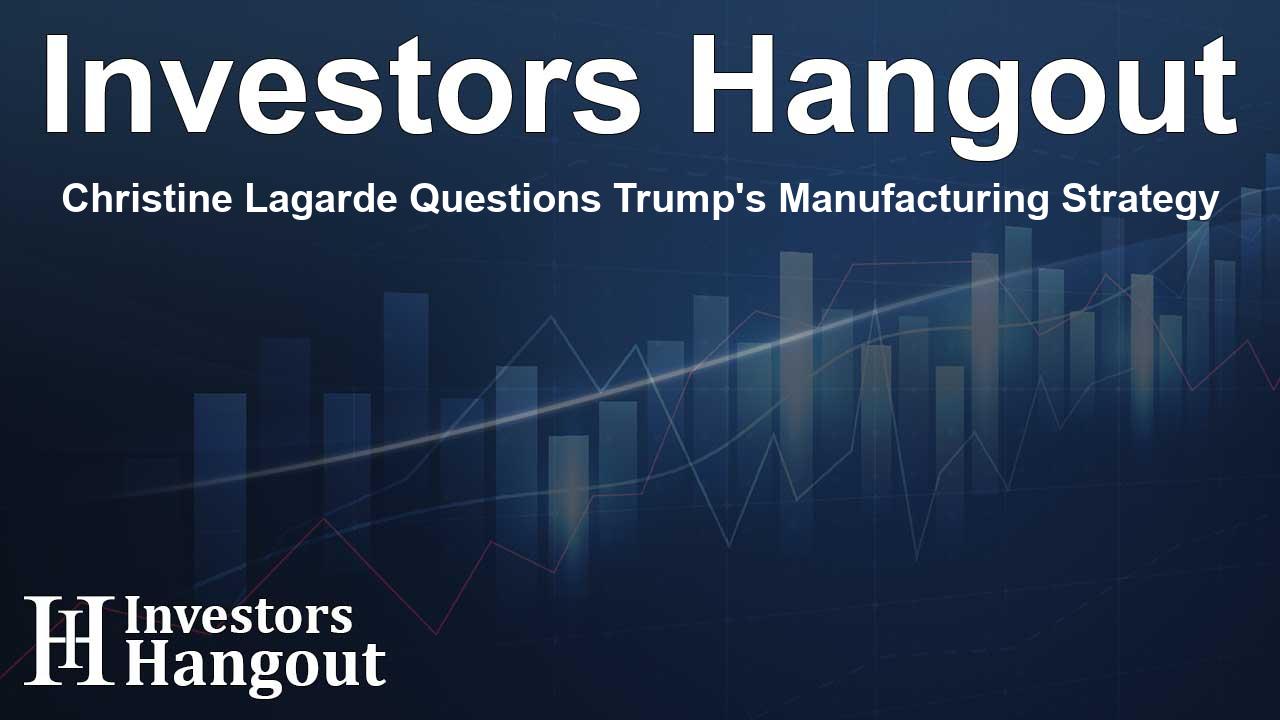Christine Lagarde Questions Trump's Manufacturing Strategy

Lagarde's Perspective on Manufacturing Policies
In a recent discussion, Christine Lagarde, President of the European Central Bank, expressed her views on U.S. President Donald Trump's strategy to enhance domestic manufacturing by imposing trade barriers. Lagarde highlighted that this approach may not be effective, as the economy is already functioning near its capacity.
Analysis of Economic Capacity
Lagarde noted that attempting to limit imports from Europe to elevate local manufacturing is not a straightforward solution. She articulated that the current status of the U.S. economy is almost ‘running hot.’ With unemployment rates being low and production capabilities strained, the process of establishing additional manufacturing facilities requires considerable time and investment.
The Challenge of Trade Barriers
The imposition of higher tariffs and trade restrictions can complicate relationships with international partners. Such moves might provoke retaliatory actions, further impacting industries reliant on global supply chains.
The Importance of Flexibility
In her view, adaptability in economic policies is crucial. The global economy operates in an interconnected manner, and rigid measures can lead to complications rather than the intended relief for local industries.
The Future of U.S. Manufacturing
Through the lens of current economic indicators, Lagarde suggested that the idea of isolating U.S. manufacturing from global influences might require a reevaluation. Strengthening domestic manufacturing could be viable, but should not come at the cost of alienating valuable international trade relations.
Investment in Innovation
For a more robust U.S. manufacturing sector, Lagarde proposed that investments should be directed towards innovation and technology. Emphasizing research and development can lead to enhanced productivity, which is far more effective than merely imposing trade barriers.
The Role of Policy Makers
Ultimately, policy makers need to balance protectionist strategies with initiatives that promote growth and collaboration. Sustainable manufacturing growth will require comprehensive strategies that facilitate both domestic improvement and international cooperation.
Frequently Asked Questions
What did Christine Lagarde say about Trump's manufacturing strategy?
Lagarde questioned the effectiveness of Trump's approach to boosting domestic manufacturing through trade barriers, noting the current capacity limits of the economy.
Why does Lagarde believe the U.S. economy is constrained?
Lagarde indicated that low unemployment rates and existing capacity constraints make it challenging to introduce additional manufacturing capabilities quickly.
How could trade barriers affect U.S.-Europe relations?
Trade barriers might provoke retaliatory measures from Europe, complicating trading relationships and impacting industries that depend on global supply chains.
What alternative strategies does Lagarde suggest for U.S. manufacturing?
Lagarde recommends investing in innovation and technology instead of imposing trade restrictions, to enhance productivity and global competitiveness.
What is the significance of flexible economic policies?
Flexible economic policies are vital for adapting to the global economy's interconnectedness, promoting both domestic growth and maintaining international collaborations.
About Investors Hangout
Investors Hangout is a leading online stock forum for financial discussion and learning, offering a wide range of free tools and resources. It draws in traders of all levels, who exchange market knowledge, investigate trading tactics, and keep an eye on industry developments in real time. Featuring financial articles, stock message boards, quotes, charts, company profiles, and live news updates. Through cooperative learning and a wealth of informational resources, it helps users from novices creating their first portfolios to experts honing their techniques. Join Investors Hangout today: https://investorshangout.com/
Disclaimer: The content of this article is solely for general informational purposes only; it does not represent legal, financial, or investment advice. Investors Hangout does not offer financial advice; the author is not a licensed financial advisor. Consult a qualified advisor before making any financial or investment decisions based on this article. The author's interpretation of publicly available data presented here; as a result, they should not be taken as advice to purchase, sell, or hold any securities mentioned or any other investments. If any of the material offered here is inaccurate, please contact us for corrections.